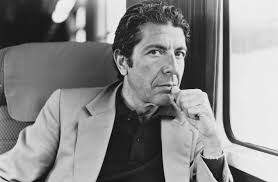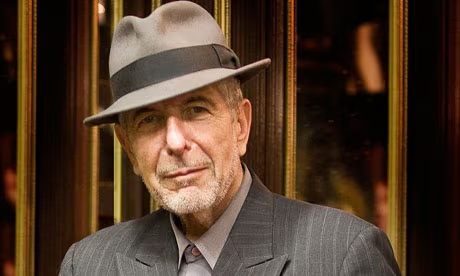
Leonard Cohen: A Voice of Longing, Love, and Redemption
Leonard Cohen (September 21, 1934 – November 7, 2016) was a Canadian songwriter, singer, poet, and novelist whose work left an indelible mark on the cultural and spiritual consciousness of the 20th and early 21st centuries. With a career spanning over six decades, Cohen distinguished himself as a deeply philosophical and introspective artist, drawing from a wide palette of human experience.
Themes such as faith and mortality, isolation and depression, betrayal and redemption, social and political conflict, and the entanglements of sexual and romantic love are the lifeblood of his artistic expression. His music and literature, woven with spiritual yearning, existential reflection, and poetic precision, positioned him not only as a great songwriter but also as a sage chronicler of the human condition.
Early Life and Literary Beginnings
Leonard Norman Cohen was born into a middle-class Jewish family in Westmount, Quebec. His father died when Cohen was just nine years old, a loss that would shape much of his introspective nature and philosophical outlook. Raised in a household steeped in both religious tradition and artistic appreciation, Cohen was introduced early to poetry, music, and spiritual reflection.
He attended McGill University, where he studied literature and won literary prizes for his poetry. His first published collection, Let Us Compare Mythologies (1956), marked the beginning of a prolific literary career. His early poems grappled with identity, mythology, and love—topics that would persist throughout his oeuvre.
Cohen’s move to the Greek island of Hydra in the 1960s furthered his immersion in a bohemian lifestyle, which influenced his subsequent novels, The Favourite Game (1963) and Beautiful Losers (1966). Both novels were experimental and deeply personal, the latter being especially noted for its wild narrative form and exploration of eroticism, mysticism, and Canadian identity.
Despite his early success as a writer, Leonard Cohen grew disillusioned with the literary world’s ability to reach a wide audience. He turned to songwriting and performance as a way to bring his poetic voice to a broader public.
Musical Career and Poetic Voice
Cohen’s debut album, Songs of Leonard Cohen (1967), introduced the world to his distinctive voice—both literally and lyrically. With tracks such as “Suzanne,” “Sisters of Mercy,” and “So Long, Marianne,” the album married minimalist folk arrangements with dense lyrical poetry. His deep baritone and understated musicality contrasted sharply with the upbeat energy of the 1960s counterculture, yet his songs resonated deeply, offering a reflective alternative to the era’s more flamboyant icons.
.
Leonard Cohen’s music defied genre, blending folk, pop, and later synthesizer-driven sounds. What truly set him apart was his lyrical sophistication. Each song was a poem, finely crafted, replete with metaphor, biblical allusion, and philosophical depth. Albums like Songs of Love and Hate (1971), Recent Songs (1979), I’m Your Man (1988), and Ten New Songs (2001) displayed an evolving but consistent exploration of his central themes.
Themes in Cohen’s Work
Faith and Mortality
One of the most persistent themes in Cohen’s work is faith, often interlaced with an acute awareness of mortality. A lifelong seeker, Cohen drew from Judaism, Christianity, Zen Buddhism, and other spiritual traditions in a quest for meaning and transcendence. Songs like “Hallelujah,” perhaps his most famous, is an intricate meditation on brokenness, divine love, and spiritual striving. With verses that intertwine sexual longing and religious imagery, the song captures the sacred in the profane and vice versa.
Leonard Cohen’s engagement with mortality was especially pronounced in his later years. Albums such as You Want It Darker (2016), released just weeks before his death, confront death directly. The title track, with its haunting refrain “Hineni, hineni” (Hebrew for “Here I am”), evokes Abraham’s response to God in the Bible—a surrender to divine will and mortality.
His lifelong spiritual inquiry also led him to spend several years at the Mount Baldy Zen Center in California, where he was ordained as a Rinzai Zen monk. This experience deepened his meditative sensibility and lent further nuance to his art, imbuing his later work with a sense of calm surrender and spiritual lucidity.
Isolation and Depression
Leonard Cohen never shied away from addressing his struggles with depression. He referred to his emotional burdens not as impediments but as essential sources of insight. This willingness to dwell in darkness made him a voice for many who found mainstream music’s optimism disingenuous.
Songs like “Famous Blue Raincoat” and “Dress Rehearsal Rag” are melancholic, confessional, and emotionally complex. The personas in these songs are often weary, regretful, and searching for redemption or release. In “Avalanche,” Cohen sings, “Your laws do not compel me / to kneel grotesque and bare,” an image that speaks to both defiance and vulnerability.
Though melancholy was a cornerstone of his artistic expression, Cohen balanced despair with dignity and humor. He famously remarked, “The depression has been kind of a background music for me,” indicating his ability to co-exist with his inner demons without being consumed by them.
Betrayal and Redemption
Love and betrayal are central motifs in Leonard Cohen’s work, often explored with a rawness that reveals both the beauty and the bitterness of intimacy. His relationships, particularly with muses like Marianne Ihlen, Janis Joplin, and Suzanne Elrod, inspired some of his most iconic songs. But Cohen rarely idealized love. Instead, he examined its fragility, its betrayals, and its potential for spiritual redemption.
In “Chelsea Hotel #2,” Cohen recounts a brief affair with Joplin with unflinching honesty and rueful tenderness. The song captures the collision between lust and loneliness, fame and emptiness. In “Bird on the Wire,” he sings, “I have tried in my way to be free,” echoing a theme that surfaces repeatedly—the pursuit of integrity amidst human fallibility.
Redemption in Leonard Cohen’s work is not found through perfection, but through the acceptance of brokenness. His song “Anthem” declares, “There is a crack in everything / That’s how the light gets in,” a now-iconic phrase that encapsulates his belief in flawed beauty and the possibility of grace.
Social and Political Conflict
Though primarily known for introspective themes, Cohen also engaged with social and political issues. His song “The Partisan,” adapted from a French Resistance anthem, honored the fight against fascism. Cohen often expressed solidarity with the oppressed, though he resisted simplistic activism. His political songs are more philosophical than polemical, preferring ambiguity to dogma.
During the 1973 Yom Kippur War, Leonard Cohen traveled to Israel and performed for Israeli troops. Though the act was criticized by some as taking sides, Cohen’s presence was deeply personal and spiritual rather than political. He sought to comfort a people under siege, acting as a troubadour rather than a propagandist.
His later songs, like “Democracy” and “The Future,” are laced with skepticism about modern political systems. “Democracy is coming to the USA,” he sings, not with triumphalism but with grim irony. These songs highlight the tension between idealism and reality in political life, delivered with Cohen’s characteristic gravitas.
Sexual and Romantic Love
Love, sex, and desire are perhaps the most visible themes in Leonard Cohen’s work. He was both a lover and a critic of love—a man who cherished intimacy yet remained conscious of its complexities. His lyrics are sensual, often erotic, but never crude. They are imbued with the tension between physical passion and spiritual yearning.
.
Songs like “Ain’t No Cure for Love,” “I’m Your Man,” and “Dance Me to the End of Love” express longing with a mixture of surrender, devotion, and irony. “Dance Me to the End of Love,” inspired in part by the Holocaust, uses the metaphor of dance to represent both sensual and tragic dimensions of human connection.
Leonard Cohen’s portrayal of women is multifaceted: at times idealized, at times flawed, always deeply human. He was capable of both reverence and critique, acknowledging the power dynamics inherent in relationships. His reflections often border on confession, as if he were trying to make peace with his own failures and betrayals.
Later Years and Legacy
Leonard Cohen continued to produce relevant, poignant work well into his 70s and 80s. After a financial betrayal by his longtime manager left him nearly bankrupt in the early 2000s, Cohen returned to touring in his 70s. These performances, marked by humility and grace, garnered new generations of fans and reinforced his status as a legendary performer.

.
His final album, You Want It Darker, is a breathtaking farewell, confronting death with serenity and poetic precision. The album is a culmination of his life’s themes: God, love, failure, acceptance, and the inevitability of death. The title track, with its chanted Hebrew and stark production, is an unforgettable final benediction.
Leonard Cohen died on November 7, 2016, shortly after the release of that final album. Yet his voice continues to echo through covers, tributes, and the enduring power of his own recordings.
Conclusion
Leonard Cohen was more than a singer or poet—he was a mystic, a philosopher, and a witness to the beauty and pain of being alive. Through the prism of his art, he examined the deepest human experiences: longing, loss, joy, doubt, and redemption. His work remains a sanctuary for those who seek meaning in suffering, humor in despair, and light in the cracks.
Cohen once said, “Poetry is just the evidence of life. If your life is burning well, poetry is just the ash.” His life burned with quiet intensity, and the ash he left behind—his poems, his songs, his voice—continues to illuminate the path for those who follow.
Check out Leonard Cohen on Amazon by clicking here.
If you found this interesting please share it with your friends and family, and check out some of our other articles on Musicians who Died in 2016.
.

